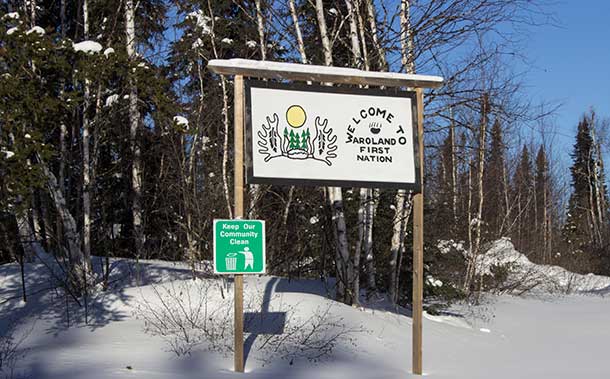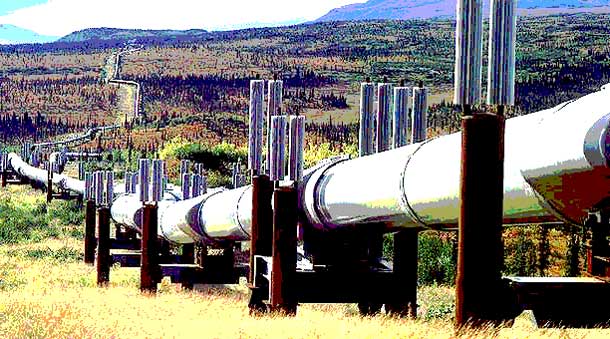
TORONTO = Two First Nations in northwest Ontario – Aroland and Ginoogaming – have just launched a precedent-setting lawsuit and injunction motion against TransCanada Pipelines, Canada and the National Energy Board, for doing and allowing damaging physical work on parts of the Mainline pipeline that runs through those First Nations’ traditional territories. This is the same pipeline that TransCanada, through its affiliate Energy East, is applying to convert from natural gas, to carry dilbit (crude oil) from the Alberta oil sands across Canada and into ships for export.
The injunction hearing is slated to be heard on January 25 at the Ontario Superior Court, in Toronto.
The physical work that the First Nations are seeking to stop – at least until the duty to consult and accommodate them about their constitutionally-protected rights is met – is called “integrity digs”. TransCanada intends to bring in heavy equipment and dig up a lot of land and expose the buried pipeline in a 30 km stretch that runs through those Nations’ traditional territories. TransCanada says it needs to do this to check and possibly repair the pipeline. TransCanada’s notice to the NEB says it intends to start the integrity digs work on January 18, but it has agreed to hold off until January 25. It also says it will continue this work up to July 18 2017.

“TransCanada is trying to push ahead with this intrusive work before the duty to consult and accommodate is met,” says Raymond Ferris, an employee working for the First Nations. “Neither they, nor the NEB, nor Canada, even admit that a duty to consult and accommodate under the Constitution is owed. TransCanada seems to take the position that since the pipeline was approved and first built starting in the late 1950s, before aboriginal peoples’ rights were ever considered, that any physical work on the land about the pipeline can be done without respecting such rights under the law today.”
“The integrity digs work will likely cause impacts on aboriginal and Treaty 9 rights to harvest (hunt, fish, trap, gather plants and medicines etc) and to protect burial grounds and other cultural heritage sites and values. They will cause impacts to the First Nations’ culture, sacred relationship to the land that is at the core of their identity as indigenous communities, and on their ability to continue to survive with the land,” says Kate Kempton, lawyer for the First Nations.
“Canadian law should require the First Nations’ consent before such activity can proceed, in accordance with the UN Declaration on the Rights of Indigenous Peoples. Canadian law is lagging behind where it needs to be in that regard. But at the very least, it requires meaningful consultation and accommodation sufficient to address the First Nations’ concerns,” says Kempton. “If Canadian law is not explicit that such requirements exist for new work on old pipelines approved in a bygone era, then it needs to be made explicit. We are pursuing such an explicit remedy here. In the lawsuit, we’re seeking declarations that the NEB Act regime which governs these pipelines, has to prohibit activities that infringe aboriginal and treaty rights. We are seeking an injunction to stop the planned integrity digs in the meantime.”
“Otherwise,” says Ferris, “pipeline companies can do pretty much what they want to First Nation lands, rights and cultures. We can’t let that continue. It defeats reconciliation. It further pushes down First Nations. How much further do we have to be pushed?”
One issue in the injunction motion is whether TransCanada is seeking to do the integrity digs work more to prepare the pipeline to be converted to carry crude oil for the Energy East project — which is far from being approved – as compared to any need to do the work to maintain the physical integrity of the pipe to carry natural gas, which is what is may be carrying now.
“We don’t know if any gas is currently moving through the pipeline right now. We haven’t been able to find that out, despite repeated requests,” says Ferris. “If it is, then since TransCanada first asked to do the integrity digs many months ago, they should have already consulted and accommodated the First Nations. The fact that no one has, is not a burden that the First Nations should bear, and is not an excuse to allow this work in defiance of the First Nations’ rights now. If the line is not carrying any gas, then why would TransCanada need to do any physical work to repair something that is now empty?”
“The NEB regime has to grow up to meet the requirements of aboriginal and treaty rights. If we don’t actually honour these rights, then they are rendered meaningless. Surely this is not what the federal government intends when it speaks of the need to bring about true reconciliation with the First Peoples through whose trust and through treaties the rest of the Canadian population came to live here,” says Kempton. “We’ll see what the court will do about this.”





